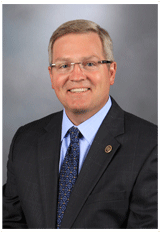The Legislature convened on Sept. 10 for the annual veto session. This year, the second highest number of bills received the governor’s veto. In addition to the 33 bills available for override consideration, the 55 line-items vetoed in the Fiscal Year 2015 budget resulted in a record number of items vetoed. This lead to a record number of veto overrides, as well.
While the veto session can last for up to 10 days, both the House and the Senate wanted to keep the number of days legislators spent in the Capitol to a minimum to avoid needlessly spending taxpayer dollars.
Even though the Senate met for more than 12 hours, and the House for approximately 16 hours, in the end, we overrode a total of 10 of the 33 bills available for veto. It took a two-thirds majority vote in both chambers to override the governor’s veto, meaning 23 of the 34 senatorial seats, and 109 of the 163 seats in the House.
I remained hopeful that my colleagues in both chambers would address and vote to override the school accreditation and student transfer bill we fought so hard to pass during session. However, Senate Bill 493 passed in the Senate, yet did not get brought up in the House.
Senate Bill 506, modifying provisions related to agriculture, also passed in the Senate but did not receive a two-thirds majority in the House. House Bill 1307, changing the minimum waiting period before a woman can have an abortion from 24 hours to 72 hours after the initial consultation with the doctor who will perform the procedure, did receive majority votes in both chambers and will take effect upon confirmation by the Secretary of State.
Other bills receiving enough votes to override the governor’s veto were Senate Bill 829, shifting the burden of proof in tax liability cases; Senate Bill 593, modifying certain provisions related to nonpartisan elections; and Senate Bill 866, modifying current laws relating to installment loan lenders.
Among the 125 total vetoed line-items, 47 were overturned, returned to the budget approximately $41 million. Some highlights of the budget were funds for $3.5 million for a reading program specifically for provisionally and unaccredited school districts, $3 million for recruitment and training for teachers in academically deficient school districts and $150,000 for the Bright Futures Program.
As a result of the veto session, on a positive note, the following day the governor released $143 million in funds he had withheld from Missouri students and schools, including $43 million in performance funding for higher education and $100 million for the foundation formula for public schools. While this is good news for our public colleges and schools, I do question the timing of the release, as well as the governor’s withhold in the first place.
I am honored to have taken part in this historic veto session, enacting laws for the betterment of our communities and our state.
As always, please feel free to contact me or my staff with any questions or concerns at any time. We look forward to hearing your comments and suggestions and trying to answer any questions you may have. You can reach us by phone at 866-277-0882 (toll-free) or 573-751-2272, or by fax at 573-526-7381.
|



